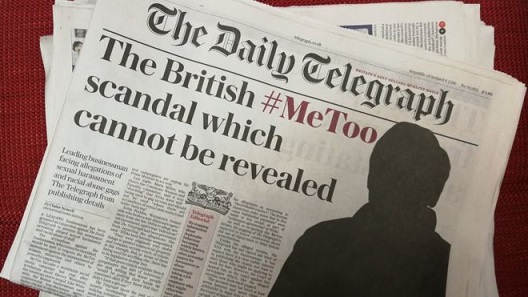
A “leading businessman” has won a legal battle to stop a newspaper printing harassment claims against him.
Three Court of Appeal judges granted an injunction to stop the Daily Telegraph publishing its article.
The judges say the five staff making the claims had been “compromised by settlement agreements” and had received “substantial” payouts to stay silent.
Theresa May would not comment directly on the case, but said some companies used such agreements “unethically”.
Mrs May said non-disclosure agreements, or NDAs, should not silence whistle blowers. She added the government would take action to make sure employees knew their rights.
A Labour MP said NDAs were being used by the rich and powerful to do “whatever they wanted”.
The Telegraph’s editor said the public “have a right to know when the powerful seek to gag the vulnerable”.
The paper said it spent eight months investigating allegations of bullying, intimidation and sexual harassment made against the businessman.
It said publishing the allegations would “be sure to reignite the #MeToo movement against the mistreatment of women, minorities and others by powerful employers”.
But after the accused boss was contacted for comment by the paper in July, he and a number of his senior staff applied for an injunction to stop the details being published.
‘Breach of confidence’
In August, a High Court judge refused to grant the gagging order.
Mr Justice Haddon-Cave said the information was “clearly capable of significantly contributing to a debate in a democratic society” and “making a contribution to a current debate of general public interest on misconduct in the workplace”.
But the executive and his managers appealed the decision, saying details of the allegations had been “disclosed in breach of confidence” as the five staff had signed NDAs.
On Tuesday, the Appeal Court judges – Sir Terence Etherton, Lord Justice Underhill and Lord Justice Henderson – published a ruling in the businessman’s favour.
It mentioned allegations of “discreditable conduct”, but said the paper was aware of NDAs signed by the accusers, in which they agreed to keep the details “confidential”.
It was therefore prevented from publishing them.
The Telegraph said the ruling made it “illegal to reveal the businessman’s identity or to identify the companies, as well as what he is accused of doing or how much he paid his alleged victims” pending a full hearing early next year.
The paper said NDAs were used in business to protect commercial confidentiality but there are concerns they are being abused to conceal wrongdoing and deter victims of potential crimes from going to police.
During prime minister’s questions on Wednesday, Mrs May declined to comment directly on the court’s decision.
However, she said: “Non-disclosure agreements cannot stop people from whistle blowing, but it is clear that some employers are using them unethically.
She added that the government would consult on whether the regulation around non-disclosure agreements could be improved, so employers and employees were aware when a NDA did not apply or could not be enforced.
Labour MP Jess Phillips told the Commons: “It seems that our laws allow rich and powerful men to pretty much do whatever they want as long as they can pay to keep it quiet.”
The contracts under the spotlight
By Clive Coleman, BBC legal correspondent
The Harvey Weinstein scandal and the #MeToo movement put the spotlight on the use and abuse of non-disclosure agreements by powerful individuals.
The concerns have reached parliament, with the Women and Equalities Committee saying they were “used unfairly by some… to silence victims of sexual harassment”.
But this case is different.
The Court of Appeal made it clear that there was no evidence any of the NDAs resulted from bullying, harassment or undue pressure, and each employee received independent legal advice before entering into them.
Also, two of the staff who made the accusations against the businessman supported the injunction.
This may seem odd but it’s not unusual, as some people, even victims, don’t want a problem at work to follow them afterwards.
NDAs are just contracts. If they are entered into freely, with proper legal advice, the courts are loathe to unpick them.
The ones used by powerful rich people to gag alleged victims are an area of massive concern, but this does not appear to be a good example of that kind of abuse.
It is likely we are going to see a lot more of these type of cases though, as the press will continue to drive on and fight where they believe there is a public interest in going behind an NDA.
Source: bbc.co.uk






Be the first to comment